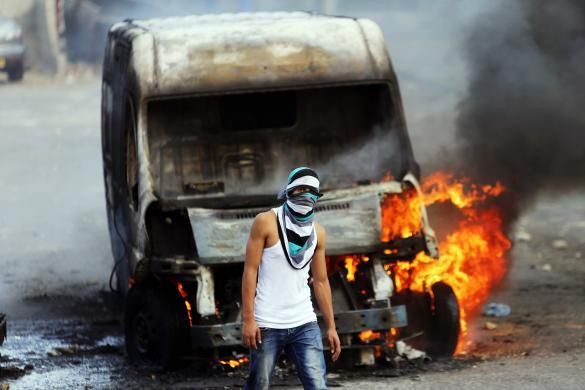Israeli-Palestinian Clashes In Jerusalem May Herald Third Intifada

Clashes between Israelis and Palestinians escalated in East Jerusalem Thursday, showing a rising trajectory of violence that Palestinian leaders, Jerusalem residents and analysts are saying signals the possible beginning of a Third Intifada. The current clashes began after a right-wing Israeli activist, American-born Yehuda Glick, was shot in an apparent assassination attempt on Wednesday evening. Following the shooting, Israeli security officers shot dead a Palestinian allegedly involved in the Glick attack, angering Palestinians living in East Jerusalem, who clashed with police Thursday in the streets.
The shooting incidents come after weeks of clashes between Arab Muslims and Israelis outside the Al-Aqsa Mosque, one of holiest places in Islam, which sits the site of the ancient Jewish temples.
The third intifada will start tomorrow. Israel, are you ready to fight the freedom struggler ? #AlAqsaUnderAttack
— KingInTheEast م (@KingChakib_) October 30, 2014Mustafa Barghouthi, general secretary of the Palestinian National Initiative, told the news site Palestine Today that "the Third Intifada will continue."
“The Palestinian people as a whole are rising up in response to Israeli crimes and abuses across the Palestinian territories, particularly in Jerusalem," he said. "Israel’s provocations in the Al-Aqsa Mosque compound and its unprecedented Judaization in Jerusalem, in addition to its constantly increasing settlement network, have created a deeply entrenched system of racial subjugation."
Yossi Mekelberg, an opinion columnist for Al Arabiya, wrote Thursday, "Almost unnoticed, a Third Intifada has been brewing in the city, threatening to spread to the rest of the West Bank. Politicians on both sides, though especially on the Israeli side, are willfully refusing to admit that."
An Israeli police officer told an Israeli news site, Walla, that "we will not allow an intifada to break out."
On Thursday, Israel shut down Al-Aqsa to worshipers, barring anyone from entering the area. Palestinian leaders called the shutdown a "declaration of war."
by closing AlAqsa, Israel is practically asking for a third Intifada.
- عمر (@MidEasternist) October 30, 2014With that, analysts are saying the environment in Jerusalem suggests that a full-fledged intifada is around the corner. The Second Intifada or uprising, an Arabic term indicating the shaking off of a yoke, began after former Israeli Prime Minister Ariel Sharon visited the Temple Mount, which includes the Al Aqsa compound, in 2000; the first lasted from 1987 to 1993.
Several Israeli media outlets have begun defining the unrest in the country's capital as a "silent intifada" -- an uprising that is occurring in Jerusalem but has been undercovered by the media.
“The fact that it hasn’t started in the West Bank is because [Palestinian Authority President Mahmoud] Abbas and the Palestinian Authority are not interested in an intifada, but in Jerusalem they have no control over what happens on the ground,” Meir Margalit, a left-wing city councilman and peace activist, told the Jerusalem Post on Thursday.
Analysts had suggested a Third Intifada would begin in the summer, during the bloody war in Gaza between Israel and the radical Muslim movement Hamas, but that proved not the case. Now, the tensions that boiled up this summer may be re-emerging.
East Jerusalem has been a source of friction in recent weeks, especially in the village of Silwan near Al-Aqsa. Earlier this week Prime Minister Benjamin Netanyahu pledged to continue building Jewish settlements in the area, which has a large Arab population, despite the international community and United States urging against it. Palestinians want East Jerusalem as the capital of a future Palestinian state, but Israel has continued to push out Arabs from the area and move settlers in. According to Al Jazeera, Jewish settler organizations have acquired more than 24 buildings in Silwan over the years, including nine in the past three months alone. About 500 settlers live there now. Israelis consider building projects in East Jerusalem to be "neighborhoods," but the Palestinians see no difference between them and more remote settlements,
Meanwhile, verbal combat between Israel and the Palestinian leadership continued Thursday. In a post on his Facebook page, Israel's Foreign Minister Avigdor Lieberman condemned Sweden's decision to recognize Palestine as a state Thursday, saying the Middle East was “more complicated than self-assembly furniture at IKEA.” He said Sweden made “a miserable decision that strengthens the extremist elements.”
Sweden is the third European Union member to recognize Palestine as a state. Malta and Cyprus have also made the decision to recognize Palestine.
© Copyright IBTimes 2024. All rights reserved.





















